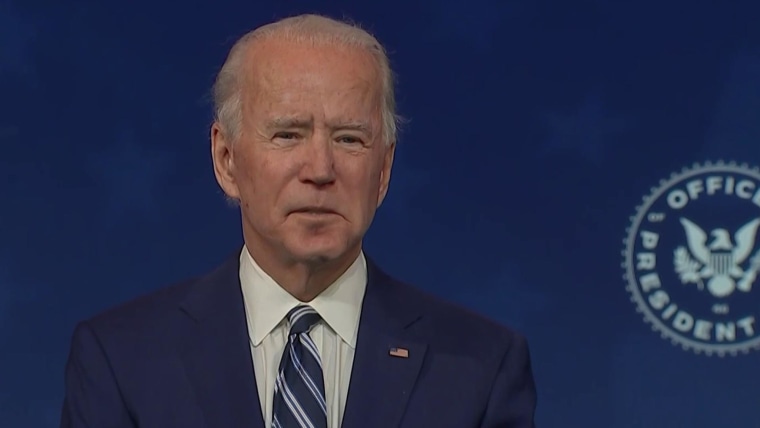WASHINGTON — President-elect Joe Biden’s nomination of Lloyd Austin has set up a tough question for Congress: confirm the first Black secretary of defense or reinforce a 73-year-old law designed to keep recently retired military officers from running the Pentagon.
Austin, a 67-year-old four-star general, led the U.S. Central Command before retiring in 2016. He needs a waiver from a 1947 law that sought to bolster civilian control of the military by requiring a seven-year cooling off period for officers after relief from active duty.
Lawmakers are divided on whether to grant it.
“I understand the importance of civilian control. I have some concerns about being asked to do a waiver,” said Sen. Mazie Hirono, D-Hawaii, who sits on the Armed Services Committee that will oversee the nomination. “So I will be taking those into consideration.”
Unlike the process of confirming nominees which is done by just the Senate, this type of exemption must be approved by both chambers. Just two Pentagon nominees have received a waiver since the requirement was enacted after World War II: Harry Truman’s pick of George Marshall in 1950, and President Donald Trump’s choice of James Mattis in 2017.
During the Trump administration, there was concern that policy decisions historically made by civilians have been left to military brass. And that is driving a desire by some to see another civilian take over when Biden becomes president
Jim Golby, a senior fellow at UT Austin’s Clements Center for National Security, argues that a waiver shouldn’t be granted. He said the Mattis waiver was predicated on having a military leader to stabilize decision-making under an inexperienced president, whereas Biden’s goal is a return to normalcy.
“If Congress grants this waiver, it will be very difficult to re-establish this law as mattering in practice,” Golby said. “The more we blur the lines between civilian and military, the more we will weaken our military and make it more political and less effective. We’ll end up with liberal generals and conservative generals, not American generals.”
The issue isn’t breaking along party lines. Some Republicans, Senate Armed Services Chair James Inhofe, R-Okla., say they support suspending the seven-year rule.
“I always support waivers,” he told reporters on Tuesday, without weighing in on Austin. “Because I don’t believe that we should have the seven years in there anyway.”
Senate Majority Whip John Thune, R-S.D., said Congress will evaluate an exemption from the law.
“That’s the exception, not the rule,” Thune told reporters Tuesday. “We did that for Mattis. And so I think it’s something that there’s a reason we have civilian oversight of the defense department. But again I’m not ruling it in or ruling it out, it’s just something, we’ll have to consider when the time comes.”
Biden said Wednesday the civilian-military relationship “has been under great stress” in recent years and argued Austin can improve it.
“There’s no doubt in my mind — not any doubt whatsoever — that this nominee will honor, respect and on a day-to-day basis breathe life into the preeminent principle of civilian leadership over military matters in our nation,” he said.
Biden asked Congress for a waiver for Austin, as it gave Mattis in 2017. It was approved in 2017 by votes of 81-17 in the Senate and 268-151 in the House before Trump took office, paving the way for Mattis to be confirmed on Inauguration Day. The bulk of the opposition came from Democrats.
Now, some of them say Austin should get the same treatment.
“He seems incredibly qualified,” Sen. Debbie Stabenow, a member of the Senate Democrats leadership team, told NBC News. “But I would assume that the Senate would not treat him differently than General Mattis. That certainly wouldn’t make any sense.”
Rep. Hakeem Jeffries, a member of the Democratic House leadership team, praised Austin as a “groundbreaking, trailblazing four-star general” who has spent his life protecting American freedoms.
Jeffries told reporters on Tuesday that he’ll wait to see the case that Biden’s team makes on a waiver, but noted that Austin has “been disconnected from the military for several years.”
“It’s my expectation that we are going to strongly support his nomination and make sure it receives both the consideration it deserves,” he said, “and address the waiver issue appropriately as it moves forward.”
Sen. Tammy Duckworth, D-Ill., a retired lieutenant colonel in the Army National Guard who voted against the Mattis waiver, told MSNBC she will oppose it again for Austin “on principle.”
But she added that she expects it to be approved and will support the nomination, calling Austin an “excellent officer” who is tested and capable and “will be an excellent secretary of defense.”
During Mattis’s term, defense officials complained that he relied more on his general officers, often cutting the civilians in policy out of the loop.
During the Trump administration, many civilian policy officials left the Pentagon and often were not replaced. In some cases, the vacancies were filled by military officers, which led defense officials to sarcastically refer to the changes as the “generals gone wild” in the Pentagon.
Now some defense officials worry that Lloyd Austin, like Mattis, will rely more on his uniformed leaders than his civilian policy team.
Sen. James Lankford, R-Okla., said he’s “not opposed” to a waiver on a Pentagon nominee, noting that he supported it for Mattis.
He said he’ll evaluate the next nominee “as a person or as a leader.”
Source: | This article originally belongs to Nbcnews.com










